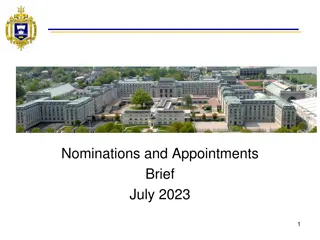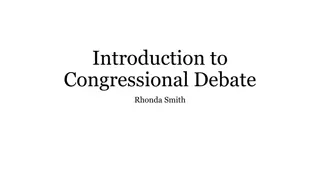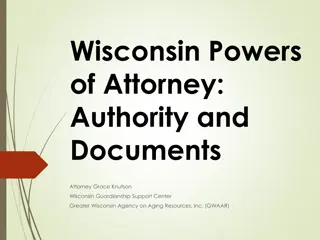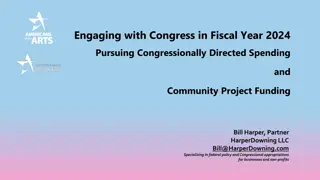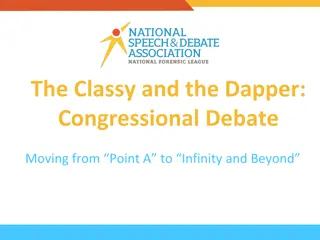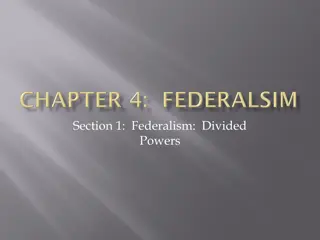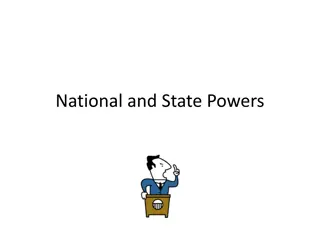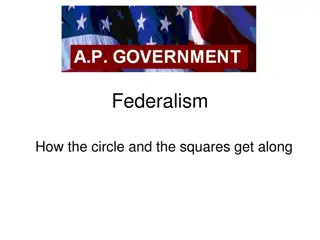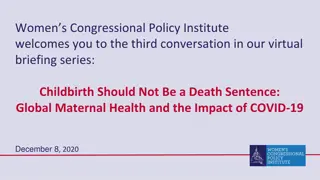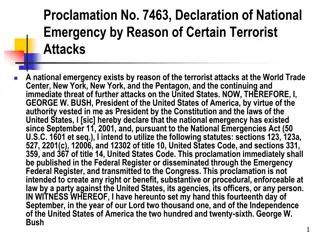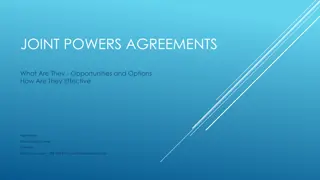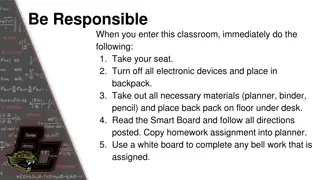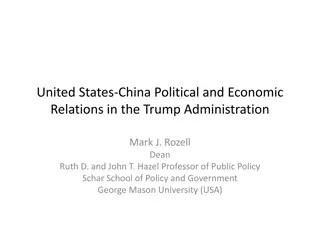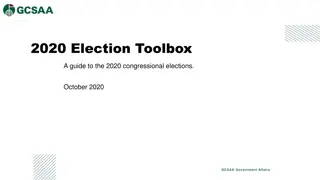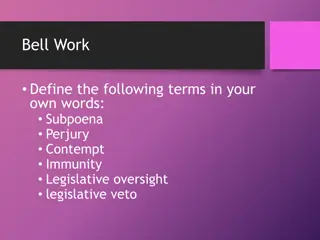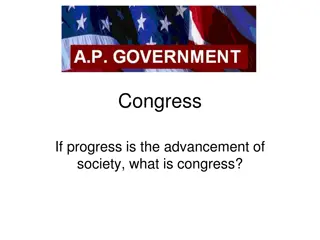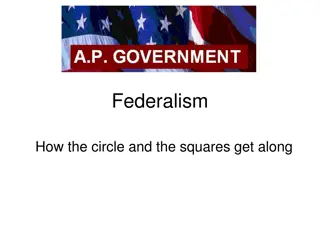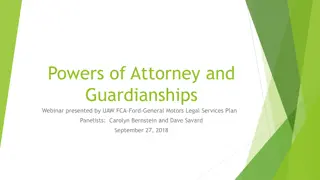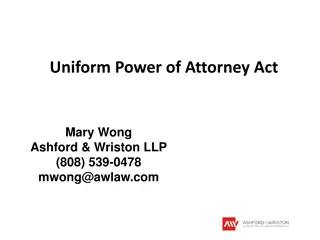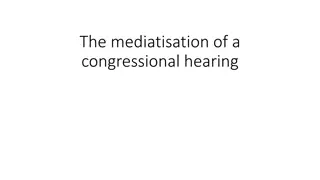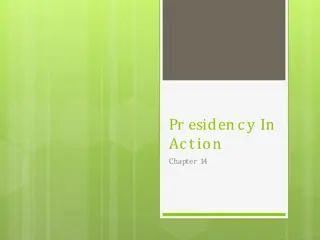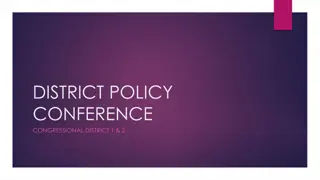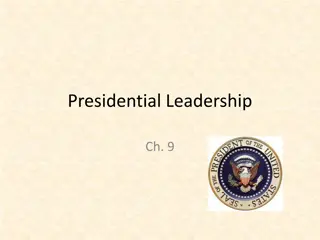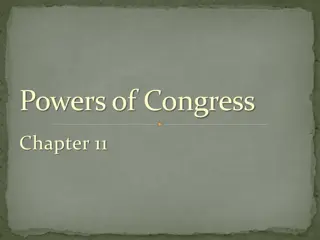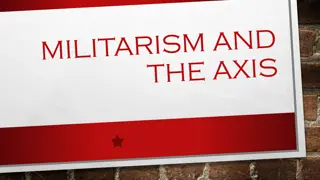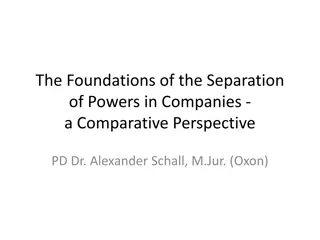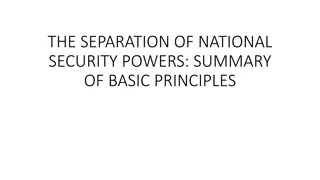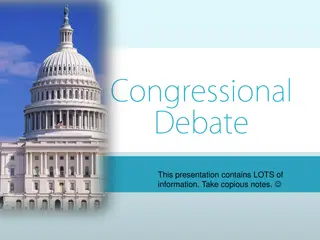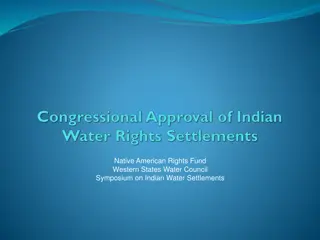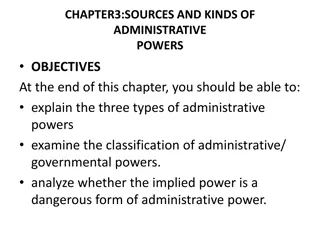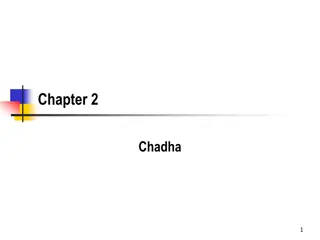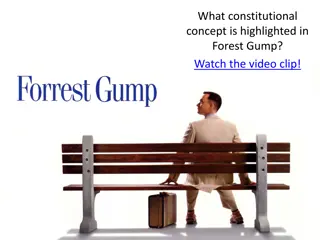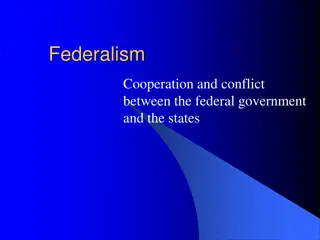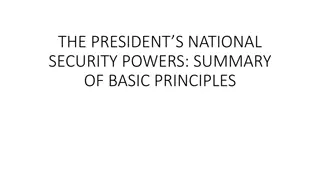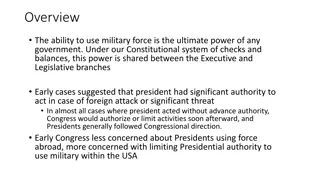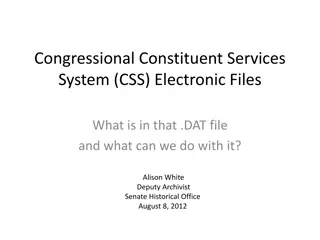READ⚡[PDF]✔ Emerging Space Powers: The New Space Programs of Asia, the Middle Ea
\"COPY LINK HERE ; https:\/\/getpdf.readbooks.link\/B004NNUV54\n\n[READ DOWNLOAD] Emerging Space Powers: The New Space Programs of Asia, the Middle East and South-America (Springer Praxis Books) | Emerging Space Powers: The New Space Programs of Asia, the Middle East and South-America (Springer Pra
1 views • 6 slides
Understanding Nominations and Appointments Process for Naval Academy Applications
Learn about the critical process of nominations and appointments for the Naval Academy, including sources for nominations, guidelines for congressional nominations, the application process, and required materials. Multiple nominations don't increase competitiveness but allow for more opportunities.
2 views • 26 slides
Essentials of Congressional Debate: Rules, Procedures, and Norms
Explore the key components of Congressional Debate including the types of legislation, preparation guidelines, contest norms, and dress code expectations. Learn about bills, resolutions, and constitutional amendments, and understand the importance of courteous behavior, proper attire, and effective
0 views • 27 slides
Understanding Police Powers on the Street Webinar
Explore the powers and procedures of police officers on the street in this informative webinar featuring Sophie Leaver, a Police and Administrative Law Solicitor from Redfern Legal Centre. Topics covered include where police derive their powers, identity requests, personal searches, complaints proce
4 views • 44 slides
Understanding Wisconsin Powers of Attorney: Core Concepts and Types
Explore the essential concepts of powers of attorney in Wisconsin, including self-determination, legal documentation, next of kin laws, and types such as health care and finance powers. Learn about the authority granted to agents and the implications of durable power of attorney.
0 views • 51 slides
Understanding Earmarks and Congressional Funding Guidance
Explore the world of Congressional earmarks, including their history, recent changes, and guidance for pursuing Congressionally Directed Spending (CDS) or Community Project Funding (CPF) in Fiscal Year 2024. Learn about eligibility criteria, project limitations, and deadlines for submission, emphasi
0 views • 16 slides
Congressional Debate Essentials: From Legislation to Speech Delivery
Delve into the structure and proceedings of a simulated United States Congress session, covering terms, legislation analysis, speech drafting, and delivery. Explore key bills and resolutions, their debate process, and how to actively participate in discussions through a detailed agenda. Enhance your
0 views • 31 slides
Understanding Federalism: Divided Powers and Constitutional Framework
Federalism is a system where powers are divided between a central government and regional entities. It involves delegated, reserved, exclusive, and concurrent powers outlined in the Constitution. The supremacy of the Constitution is pivotal in establishing a unified federal government.
0 views • 5 slides
Understanding National and State Powers in the United States
The Constitution grants specific powers to the national government, including expressed, implied, and inherent powers. States have reserved powers, and there are concurrent powers shared by both levels of government. The Supremacy Clause ensures that national laws take precedence over state laws. Ex
0 views • 13 slides
The Congressional Award Initiative: Recognizing Youth Achievement
The Congressional Award is a prestigious program recognizing initiative, service, and achievement in American youth aged 13-23. Established by Congress in 1979, it encourages goal-setting, citizenship, and public service through voluntary activities in areas like personal development, physical fitne
4 views • 13 slides
Understanding Federalism in the United States
Federalism in the United States involves the relationship between the federal government and state governments, with terms such as delegated powers, reserved powers, concurrent powers, and the Elastic Clause playing key roles. The aftermath of events like Hurricane Katrina and policies such as No Ch
0 views • 30 slides
Global Maternal Health and COVID-19 Impact Briefing by Women's Congressional Policy Institute
The virtual briefing series hosted by Women's Congressional Policy Institute on Global Maternal Health and the Impact of COVID-19 featured speakers discussing the challenges, initiatives, and collaborations to improve maternal health worldwide. Notable speakers included Cindy Hall from WCPI, Stacey
0 views • 6 slides
Understanding National Emergency Declarations and Emergency Powers Laws
This content delves into the legal aspects of national emergency declarations, emergency powers laws, and judicial review of emergency declarations. It covers the purpose, termination, historical context, congressional oversight, and impact on presidential powers. It also explores the complexities o
0 views • 6 slides
Understanding Joint Powers Agreements: Opportunities, Options, and Effectiveness
Joint Powers Agreements (JPAs) enable public agencies to collaborate efficiently, providing services and facilities in line with various factors. Idaho Code outlines the purposes, definitions, and powers that can be jointly exercised. This legal framework facilitates cooperation among entities, alth
0 views • 34 slides
Classroom Guidelines for Lesson on Properties of Exponents
Follow the classroom guidelines for this lesson on Properties of Exponents. Learn about the rules of exponents, how to simplify expressions, and complete bell work matching equations with properties. Homework includes worksheets on horse-breeding and dog eating table scraps. Understand product, quot
0 views • 10 slides
US-China Relations in the Trump Administration: Unilateral Presidential Actions and Congressional Dynamics
The article discusses the evolving US-China political and economic relations during the Trump administration, focusing on unilateral presidential actions, Congress's role, and the influence of the federal courts. It highlights President Trump's aggressive trade agenda, challenges to his reliance on
0 views • 24 slides
2020 Congressional Elections Overview: Senate and House Races Analysis
In the 2020 congressional elections, focus is on the Senate and House races. Democrats aim to gain Senate majority by winning competitive seats like Arizona and North Carolina. In the House, Republicans need to pick up 18 seats to win the majority. Key factors include swing states and candidate recr
0 views • 8 slides
Understanding Legal Terms and Congressional Powers in the US Government
This content covers the definitions of legal terms like subpoena, perjury, contempt, immunity, legislative oversight, and legislative veto, along with the powers of investigation and oversight in the US Congress. It also highlights the balance of power between the executive and legislative branches,
0 views • 15 slides
Understanding the Role and Structure of Congress in the US Government
Congress, as the legislative branch of the US government, plays a vital role in advancing society by making laws and representing the interests of the American people. Founded with intentions to balance powers and represent states of different sizes, Congress is divided into the House of Representat
0 views • 32 slides
Understanding Federalism: Powers, Relationships, and Key Terms
Explore the concept of Federalism through the relationship between the federal government (circle) and state governments (squares). Discover the powers involved such as Delegated, Reserved, Concurrent, and Prohibited powers. Delve into significant cases like McCulloch v. Maryland, terms like the Ela
0 views • 28 slides
Understanding Powers of Attorney and Guardianships Presentation
This presentation covers important aspects of Powers of Attorney and Guardianships, including types of powers of attorneys, when they are needed, who should be given power of attorney, responsibilities if named as an attorney, and considerations regarding revocation. It also discusses the need for g
0 views • 11 slides
Understanding the Uniform Power of Attorney Act and Hawaii Act 22
Explore the significance of the Uniform Power of Attorney Act and Hawaii Act 22 regarding Powers of Attorney, termination of agent's authority, general powers granted, and more. Learn about the legal document granting authority to act on behalf of a principal and the termination clauses that may be
0 views • 22 slides
The Mediatisation of Congressional Hearings: a Media Analysis
An exploration of how congressional hearings, particularly those involving the Clintons, transition into media coverage, highlighting the adoption of textual constructions and discursive strategies by the press. The study delves into the producer's perspective, emphasizing the influence of audience
0 views • 25 slides
Understanding Presidential Powers in the United States
The content discusses various powers of the President of the United States, including oath of office, executive orders, appointment power, removal power, diplomatic and military powers, treaties and agreements, commander-in-chief role, and legislative and judicial powers. It covers aspects like maki
0 views • 12 slides
Educational Leadership and Instructional Supervision in Congressional District Policy Conference
This content showcases the district policy conference in Congressional District 1 & 2, focusing on the mantra of continuous improvement and the key officials leading the educational initiatives. It emphasizes duties and responsibilities such as monitoring fund utilization and improving school perfor
0 views • 34 slides
Powers of Congress: Legislative, Implied, and Congressional Powers Explained
Explore the various powers of Congress, including legislative powers such as enumerated and implied powers, as well as congressional powers like regulating commerce and funding the government through taxes. Discover how Congress exercises authority granted by the Constitution to fulfill its roles an
0 views • 23 slides
Understanding Presidential Powers and Leadership in the U.S.
The Constitution lays a broad framework for presidential powers, with inherent powers being claimed by presidents outside the Constitution. Informal sources of power, such as executive privilege, also play a role. Modern presidents use mass media to build support for their ideas but face limitations
0 views • 21 slides
Powers of Congress and Constitutional Framework
The powers of Congress in the United States are shaped and limited by two fundamental facts: limited government and a federal system. The Constitution grants Congress powers through expressed, implied, and inherent powers. The Congressional view of power varies between strict constructionists and li
0 views • 25 slides
The Formation and Goals of the Axis Powers in World War II
The Axis Powers, composed of Italy, Japan, and Germany, were established to challenge the existing European order and expand their influence. Through alliances and shared military ambitions, they aimed to dominate different regions of the world during World War II, with Germany targeting Europe, Ita
0 views • 8 slides
The Foundations of the Separation of Powers in Companies
The separation of powers in companies is based on the dualism of organs: the Board and General Meeting. The actual situation in companies diverges between large public companies with autonomous management and smaller private companies with owner-operators. The search for the foundations of the separ
0 views • 15 slides
Understanding the Separation of National Security Powers
The separation of national security powers involves the formalist view where Congress makes laws, the Executive executes them, and the courts interpret them. The branches' powers are often blurred, with Congress able to delegate lawmaking power to the Executive. The Executive can also acquire custom
0 views • 8 slides
Understanding Congressional Debate in the United States
This presentation delves into the nuances of Congressional Debate, a format modeled after the United States Congress where students debate proposed federal legislation. It covers key aspects such as types of legislation, vocabulary, roles like Senators/Representatives and Presiding Officer, parliame
0 views • 49 slides
Addressing Challenges in Indian Water Settlements: Funding and Congressional Engagement
The Native American Rights Fund and Western States Water Council Symposium highlights challenges in Indian water settlements, such as funding issues and Congressional engagement strategies. Addressing funding challenges includes extending the Reclamation Water Settlement Fund and ensuring reliable f
0 views • 7 slides
Understanding Administrative Powers and Objectives
Explore the sources and types of administrative powers, including express, implied, and incidental powers. Delve into the classification of governmental powers and evaluate the implications of implied powers. Gain insights into how constitutional provisions and delegated legislation contribute to th
0 views • 16 slides
The Complexities of Congressional Power: Insights from Chadha Case
Explore the intricate dynamics of congressional power in the context of the INS v. Chadha case, legislative vetoes, limits on congressional power over aliens, immigration debates, and background on deportation proceedings. Understand the evolving political questions surrounding immigration and the r
0 views • 22 slides
Understanding Federalism in the US Constitution
Forest Gump showcases the conflict between state and federal powers, exemplified by Governor George Wallace's refusal to desegregate the University of Alabama. The scenario underscores the concept of federalism, which isn't explicitly stated in the Constitution but is evident in the division of powe
0 views • 18 slides
Understanding Federalism: Cooperation and Conflict Between Governments
Federalism entails the division and sharing of powers between national and state governments, aiming for cooperative problem-solving. James Madison highlighted the need for checks and balances to control government abuse. The Constitution delegates specific powers to the national government while al
0 views • 9 slides
Presidential National Security Powers: Summary of Basic Principles
In Zivotofsky II, the Supreme Court recognized the President's exclusive implied powers despite acknowledging the role of Congress in lawmaking. While the President engages in foreign affairs activities, no general plenary and exclusive foreign affairs power is explicitly vested in the Constitution.
0 views • 9 slides
Constitutional War Powers in the United States
The use of military force is a crucial power of the government, shared between the Executive and Legislative branches under the Constitution. Congress holds the War Power, granting authority to declare war, raise armies, and regulate forces, while the President serves as the Commander-in-Chief. The
0 views • 11 slides
Accessing and Managing Congressional Constituent Services System Electronic Files
Learn about the contents of .DAT files in the Congressional Constituent Services System (CSS) Electronic Files, including how to open and manipulate them using Microsoft Office applications like Excel. Discover accompanying documentation and tips for handling large data sets effectively.
0 views • 14 slides
![READ⚡[PDF]✔ Emerging Space Powers: The New Space Programs of Asia, the Middle Ea](/thumb/21554/read-pdf-emerging-space-powers-the-new-space-programs-of-asia-the-middle-ea.jpg)
